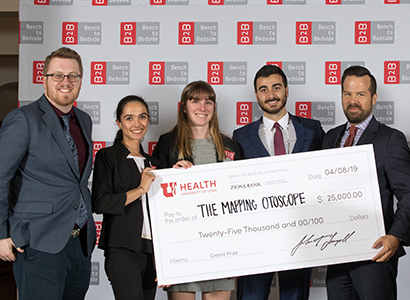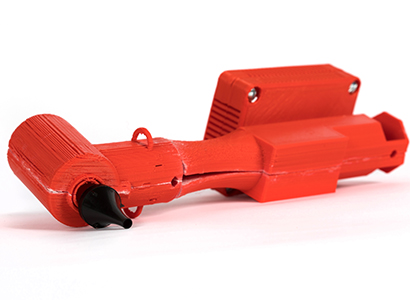

Author: Chloe Wilcox
2019 Grand Prize Winners of the Bench to Bedside Competition
While a sea of suits and echoing voices are typical at the Utah State Capitol, many of the suits and voices on April 8th at the annual Bench to Bedside competition belonged to a younger crowd than usual. Enthusiastic university students from across the state and beyond spent the evening engaging with judges, volunteers, and fellow competitors. The capitol’s rotunda was lined wall to wall with presentation poster boards, as attendees adamantly voted on their favorite innovations.
Created by the Center for Medical Innovation (CMI), Bench to Bedside allows university students to create medical and global health innovations, by providing them with the tools necessary to succeed. The students formed into multidisciplinary teams, and were given six months, access to over 100 health care providers, and $500 to create their innovations.
The annual competition at the capitol was the culmination of those six months. “It’s incredible getting to talk to everyone about our ideas after working on them for so long,” recounted Lindsay Sheering, a current biomedical engineering student at the University of Utah.
“I don’t think any of us thought we would develop a medical device,” exclaimed Young Hong, member of the legacy PreOv team. As last year’s grand prize winners, they were thrilled to receive this year’s Fred Lampropoulos Innovation Award. “Bench to Bedside has changed all of our lives.”

John Langell, executive director of CMI, explained that the students are the“secret sauce” of the program. “You’d be surprised at what a tremendous impact [they] can have creating new solutions that are disruptive and better than anything we have currently,” he insisted. As a surgeon himself, Langell admitted that often times students have better insights and expertise in some areas that can help lend to these new innovations.
By the numbers, Bench to Bedside has made a lasting impact over the past nine years. With over 155 patents and 60 companies growing from the program, it is easy to see the physical footprint. However, as Langell put it, the most important number is one that can’t quite be calculated; it is the amount of lives being saved by these students’ innovations.
Grand Prize Winners: The Mapping Otoscope, $25,000
Runner Up: Flourix, $10,000